What disturbs and depresses young people is the hunt for happiness on the firm assumption that it must be met with in life. From this arises constantly deluded hope and so also dissatisfaction. Deceptive images of a vague happiness hover before us in our dreams, and we search in vain for their original. Much would have been gained if, through timely advice and instruction, young people could have had eradicated from their minds the erroneous notion that the world has a great deal to offer them. .Arthur Schopenhauer
If children were brought into the world by an act of pure reason alone, would the human race continue to exist? Would not a man rather have so much sympathy with the coming generation as to spare it the burden of existence, or at any rate not take it upon himself to impose that burden upon it in cold blood?Arthur Schopenhauer
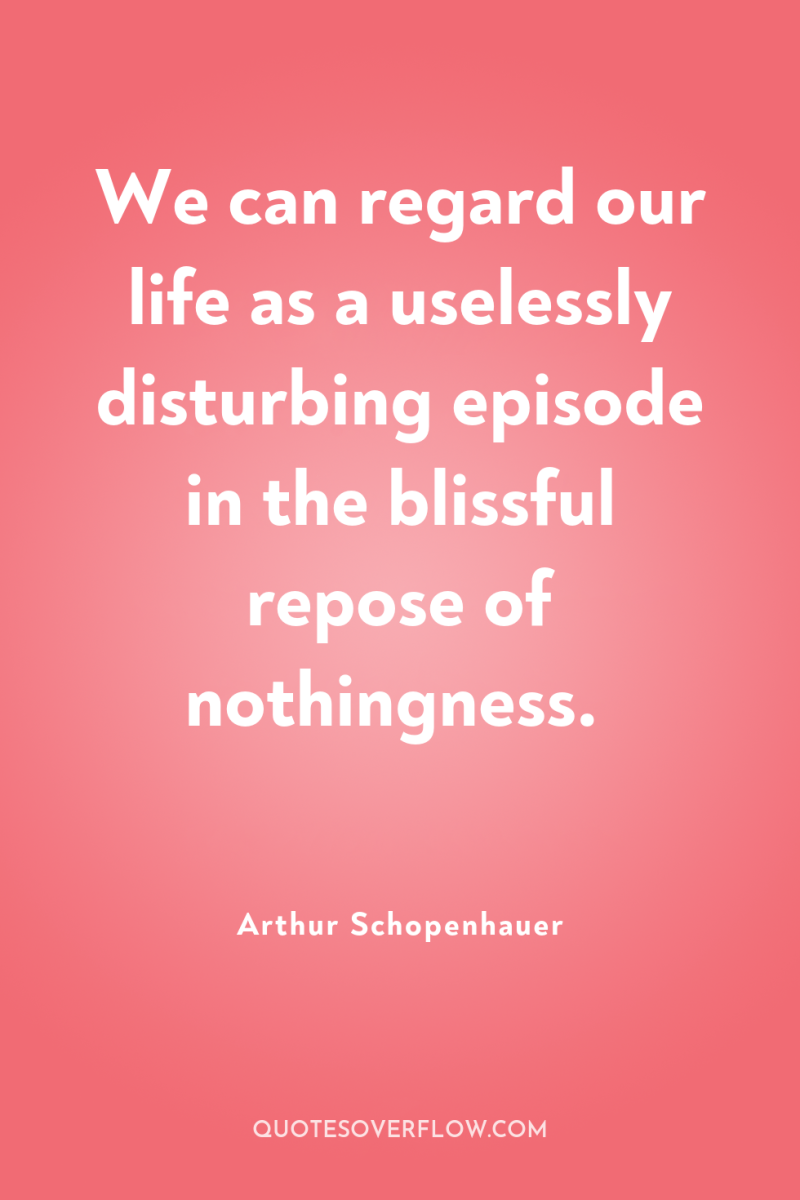
We can regard our life as a uselessly disturbing episode in the blissful repose of nothingness.Arthur Schopenhauer
Talent hits a target no one else can hit. Genius hits a target no one else can see.Arthur Schopenhauer
We forfeit three-fourths of ourselves in order to be like other people.Arthur Schopenhauer

Great men are like eagles, and build their nest on some lofty solitudeArthur Schopenhauer

The person who writes for fools is always sure of a large audience.Arthur Schopenhauer
It often happens that we blurt out things that may in some kind of way be harmful to us, but we are silent about things that may make us look ridiculous; because in this case effect follows very quickly on cause.Arthur Schopenhauer
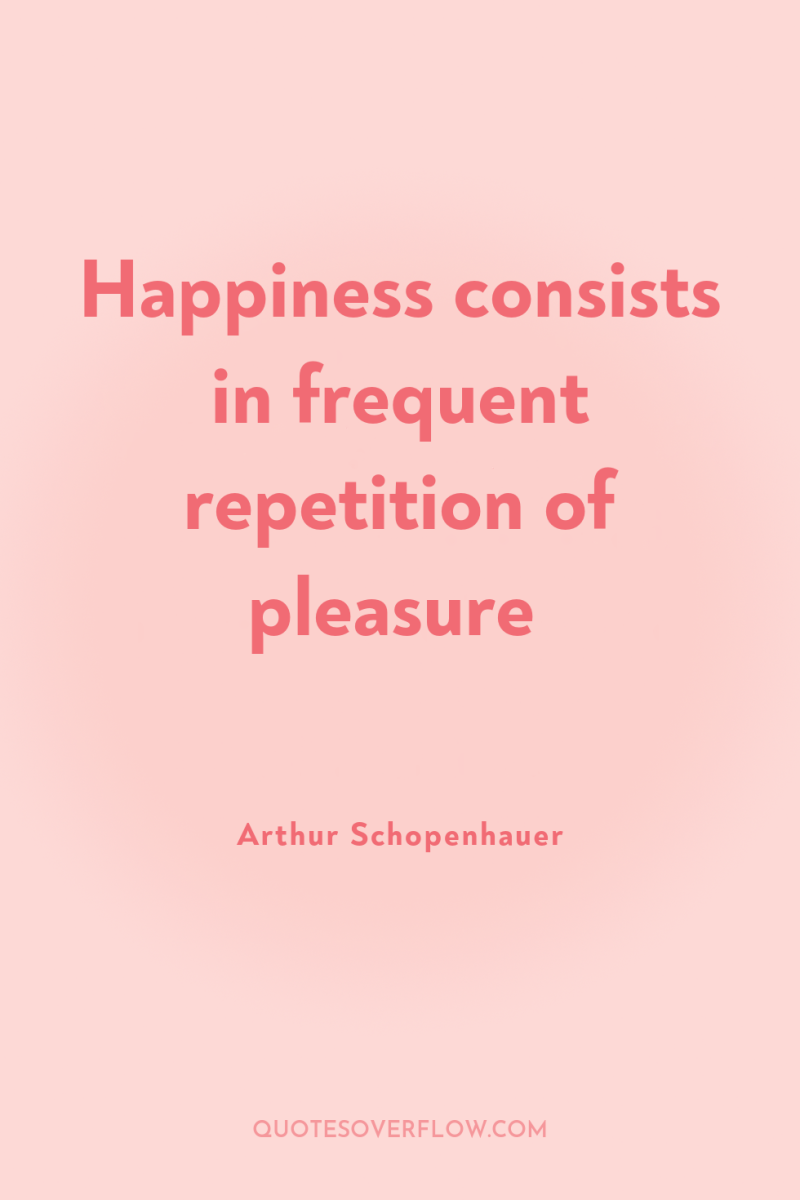
Happiness consists in frequent repetition of pleasureArthur Schopenhauer
Philosophy ... is a science, and as such has no articles of faith; accordingly, in it nothing can be assumed as existing except what is either positively given empirically, or demonstrated through indubitable conclusions.Arthur Schopenhauer
Just as one spoils the stomach by overfeeding and thereby impairs the whole body, so can one overload and choke the mind by giving it too much nourishment. For the more one reads the fewer are the traces left of what one has read; the mind is like a tablet that has been written over and over. Hence it is impossible to reflect; and it is only by reflection that one can assimilate what one has read. If one reads straight ahead without pondering over it later, what has been read does not take root, but is for the most part lost. .Arthur Schopenhauer
How very paltry and limited the normal human intellect is, and how little lucidity there is in the human consciousness, may be judged from the fact that, despite the ephemeral brevity of human life, the uncertainty of our existence and the countless enigmas which press upon us from all sides, everyone does not continually and ceaselessly philosophize, but that only the rarest of exceptions do.Arthur Schopenhauer
The best consolation in misfortune or affliction of any kind will be the thought of other people who are in a still worse plight than yourself; and this is a form of consolation open to every one. But what an awful fate this means for mankind as a whole! We are like lambs in a field, disporting themselves under the eye of the butcher, who chooses out first one and then another for his prey.Arthur Schopenhauer
The intellectual attainments of a man who thinks for himself resemble a fine painting, where the light and shade are correct, the tone sustained, the colour perfectly harmonised; it is true to life. On the other hand, the intellectual attainments of the mere man of learning are like a large palette, full of all sorts of colours, which at most are systematically arranged, but devoid of harmony, connection and meaning.Arthur Schopenhauer
NOT to my contemporaries, not to my compatriots but to mankind I commit my now completed work in the confidence that it will not be without value for them, even if this should be late recognised, as is commonly the lot of what is good. For it cannot have been for the passing generation, engrossed with the delusion of the moment, that my mind, almost against my will, has uninterruptedly stuck to its work through the course of a long life.preface to the second edition of "the world as will and representation .Arthur Schopenhauer

After your death, you will be what you were before your birth.Arthur Schopenhauer

Compassion is the basis of all moralityArthur Schopenhauer
Writers may be classified as meteors, planets, and fixed stars. They belong not to one system, one nation only, but to the universe. And just because they are so very far away, it is usually many years before their light is visible to the inhabitants of this earth.Arthur Schopenhauer
The fundament upon which all our knowledge and learning rests is the inexplicable.Arthur Schopenhauer
There is not much to be got anywhere in the world. It is filled with misery and pain; if a man escapes these, boredeom lies in wait for him at every corner. Nay more; it is evil which generally has the upper hand, and folly that makes the most noise. Fate is cruel and mankind pitiable.Arthur Schopenhauer
For an author to write as he speaks is just as reprehensible as the opposite fault, to speak as he writes; for this gives a pedantic effect to what he says, and at the same time makes him hardly intelligibleArthur Schopenhauer
Qualsiasi uomo notevole, chiunque cioè non appartenga a quei 5/6 dell'umanità dotati tanto miseramente dalla natura, rimarrà dopo i quarant'anni difficilmente esente da una certa traccia di misantropia.Arthur Schopenhauer
The most perfect and satisfactory knowledge is that of perception but this is limited to the absolutely particular, to the individual. The comprehension of the many and the various into *one* representation is possible only through the *concept*, in other words, by omitting the differences; consequently, the concept is a very imperfect way of representing things. The particular, of course, can also be apprehended immediately as a universal, namely when it is raised to the (Platonic) *Idea*; but in this process, which I have analysed in the third book, the intellect passes beyond the limits of individuality and therefore of time; moreover, this is only an exception. These inner and essential imperfections of the intellect are further increased by a disturbance to some extent external to it but yet inevitable, namely, the influence that the *will* exerts on all its operations, as soon as that will is in any way concerned in their result. Every passion, in fact every inclination or disinclination, tinges the objects of knowledge with its colour. Most common of occurrence is the falsification of knowledge brought about by desire and hope, since they show us the scarcely possible in dazzling colours as probable and well-nigh certain, and render us almost incapable of comprehending what is opposed to it. Fear acts in a similar way; every preconceived opinion, every partiality, and, as I have said, every interest, every emotion, and every predilection of the will act in an analogous manner. Finally, to all these imperfections of the intellect we must also add the fact that it grows old with the brain; in other words, like all physiological functions, it loses its energy in later years; in this way all its imperfections are then greatly increased.”–from_ The World as Will and Representation_. Translated from the German by E. F. J. Payne in two volumes: volume II, pp. 139-141.Arthur Schopenhauer
I now turn to a *subjective* consideration that belongs here; yet I can give even less distinctness to it than to the objective consideration just discussed, for I shall be able to express it only by image and simile. Why is our consciousness brighter and more distinct the farther it reaches outwards, so that its greatest clearness lies in sense perception, which already half belongs to things outside us; and, on the other hand, becomes more obscure as we go inwards, and leads, when followed to its innermost recesses, into a darkness in which all knowledge ceases? Because, I say, consciousness presupposes *individuality*; but this belongs to the mere phenomenon, since, as the plurality of the homogeneous, it is conditioned by the forms of the phenomenon, time and space. On the other hand, our inner nature has its root in what is no longer phenomenon but thing-in-itself, to which therefore the forms of the phenomenon do not reach; and in this way, the chief conditions of individuality are wanting, and distinct consciousness ceases therewith. In this root-point of existence the difference of beings ceases, just as that of the radii of a sphere ceases at the centre. As in the sphere the surface is produced by the radii ending and breaking off, so consciousness is possible only where the true inner being runs out into the phenomenon. Through the forms of the phenomenon separate individuality becomes possible, and on this individuality rests consciousness, which is on this account confined to phenomena. Therefore everything distinct and really intelligible in our consciousness always lies only outwards on this surface on the sphere. But as soon as we withdraw entirely from this, consciousness forsakes us―in sleep, in death, and to a certain extent also in magnetic or magic activity; for all these lead through the centre. But just because distinct consciousness, as being conditioned by the surface of the sphere, is not directed towards the centre, it recognizes other individuals certainly as of the same kind, but not as identical, which, however, they are in themselves. Immortality of the individual could be compared to the flying off at a tangent of a point on the surface; but immortality, by virtue of the eternity of the true inner being of the whole phenomenon, is comparable to the return of that point on the radius to the centre, whose mere extension is the surface. The will as thing-in-itself is entire and undivided in every being, just as the centre is an integral part of every radius; whereas the peripheral end of this radius is in the most rapid revolution with the surface that represents time and its content, the other end at the centre where eternity lies, remains in profoundest peace, because the centre is the point whose rising half is no different from the sinking half. Therefore, it is said also in the *Bhagavad-Gita*: *Haud distributum animantibus, et quasi distributum tamen insidens, animantiumque sustentaculum id cognoscendum, edax et rursus genitale* (xiii, 16, trans. Schlegel) [Undivided it dwells in beings, and yet as it were divided; it is to be known as the sustainer, annihilator, and producer of beings]. Here, of course, we fall into mystical and metaphorical language, but it is the only language in which anything can be said about this wholly transcendent theme."―from_ The World as Will and Representation_. Translated from the German by E. F. J. Payne. In Two Volumes, Volume II, pp. 325-326 .Arthur Schopenhauer
What is more, in fact, we very soon look upon the world as something whose non-existence is not only conceivable, but even preferable to its existence. Therefore our astonishment at it easily passes into a brooding over that *fatality* which could nevertheless bring about its existence, and by virtue of which such an immense force as is demanded for the production and maintenance of such a world could be directed so much against its own interest and advantage."―from_ The World as Will and Representation_. Translated from the German by E. F. J. Payne. In Two Volumes, Volume II, p. 171 .Arthur Schopenhauer
In fact, the balance wheel which maintains in motion the watch of metaphysics that never runs down, is the clear knowledge that this world's non-existence is just as possible as its existence."―from_ The World as Will and Representation_. Translated from the German by E. F. J. Payne. In Two Volumes, Volume II, p. 171Arthur Schopenhauer
We also find *physics*, in the widest sense of the word, concerned with the explanation of phenomena in the world; but it lies already in the nature of the explanations themselves that they cannot be sufficient. *Physics* is unable to stand on its own feet, but needs a *metaphysics* on which to support itself, whatever fine airs it may assume towards the latter. For it explains phenomena by something still more unknown than are they, namely by laws of nature resting on forces of nature, one of which is also the vital force. Certainly the whole present condition of all things in the world or in nature must necessarily be capable of explanation from purely physical causes. But such an explanation―supposing one actually succeeded so far as to be able to give it―must always just as necessarily be burdened with two essential imperfections (as it were with two sore points, or like Achilles with the vulnerable heel, or the devil with the cloven foot). On account of these imperfections, everything so explained would still really remain unexplained. The first imperfection is that the *beginning* of the chain of causes and effects that explains everything, in other words, of the connected and continuous changes, can positively *never* be reached, but, just like the limits of the world in space and time, recedes incessantly and *in infinitum*. The second imperfection is that all the efficient causes from which everything is explained always rest on something wholly inexplicable, that is, on the original *qualities* of things and the *natural forces* that make their appearance in them. By virtue of such forces they produce a definite effect, e.g., weight, hardness, impact, elasticity, heat, electricity, chemical forces, and so on, and such forces remain in every given explanation like an unknown quantity, not to be eliminated at all, in an otherwise perfectly solved algebraical equation. Accordingly there is not a fragment of clay, however little its value, that is not entirely composed of inexplicable qualities. Therefore these two inevitable defects in every purely physical, i.e., causal, explanation indicate that such an explanation can be only *relatively* true, and that its whole method and nature cannot be the only, the ultimate and hence sufficient one, in other words, cannot be the method that will ever be able to lead to the satisfactory solution of the difficult riddles of things, and to the true understanding of the world and of existence; but that the *physical* explanation, in general and as such, still requires one that is *metaphysical*, which would furnish the key to all its assumptions, but for that very reason would have to follow quite a different path. The first step to this is that we should bring to distinct consciousness and firmly retain the distinction between the two, that is, the difference between *physics* and *metaphysics*. In general this difference rests on the Kantian distinction between *phenomenon* and *thing-in-itself*. Just because Kant declared the thing-in-itself to be absolutely unknowable, there was, according to him, no *metaphysics* at all, but merely immanent knowledge, in other words mere *physics*, which can always speak only of phenomena, and together with this a critique of reason which aspires to metaphysics."―from_ The World as Will and Representation_. Translated from the German by E. F. J. Payne. In Two Volumes, Volume II, pp. 172-173 .Arthur Schopenhauer
Only by the aid of language does reason bring about its most important achievements, namely the harmonious and consistent action of several individuals, the planned cooperation of many thousands, civilization, the State; and then, science, the storing up of previous experience, the summarizing into one concept of what is common, the communication of truth, the spreading of error, thoughts and poems, dogmas and superstitions. The animal learns to know death only when he dies, but man consciously draws every hour nearer his death; and at times this makes life a precarious business, even to the man who has not already recognized this character of constant annihilation in the whole of life itself.Arthur Schopenhauer
Vladimir Kush , Shell Bronze , Lovers Entwined (painting)“Why, then, does the man in love hang with complete abandon on the eyes of his chosen one, and is ready to make every sacrifice for her? Because it is his immortal part that longs for her; it is always the mortal part alone that longs for everything else. That eager and even ardent longing, directed to a particular woman, is therefore an immediate pledge of the indestructibility of the kernel of our true nature…”―from_ The World as Will and Representation_. Translated from the German by E. F. J. Payne. In Two Volumes, Volume II, p. 559 .Arthur Schopenhauer
Why, then, does the man in love hang with complete abandon on the eyes of his chosen one, and is ready to make every sacrifice for her? Because it is his immortal part that longs for her; it is always the mortal part alone that longs for everything else. That eager and even ardent longing, directed to a particular woman, is therefore an immediate pledge of the indestructibility of the kernel of our true nature…”―from_ The World as Will and Representation_. Translated from the German by E. F. J. Payne. In Two Volumes, Volume II, p. 559 .Arthur Schopenhauer

No one writes anything worth writing, unless he writes entirely for the sake of his subject.Arthur Schopenhauer

Truth is most beautiful undraped.Arthur Schopenhauer

A sense of humour is the only divine quality of manArthur Schopenhauer
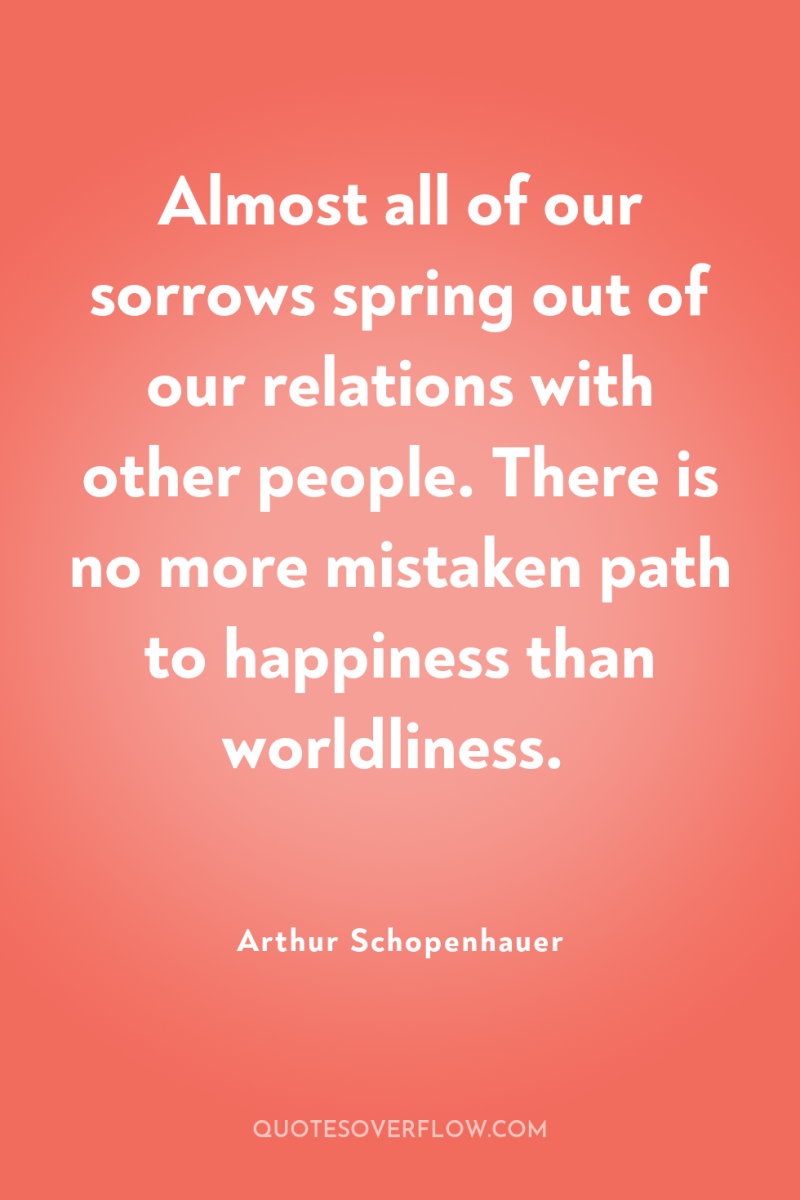
Almost all of our sorrows spring out of our relations with other people. There is no more mistaken path to happiness than worldliness.Arthur Schopenhauer

Mostly it is loss which teaches us about the worth of things.Arthur Schopenhauer
Death is the true inspiring genius, or the muse of philosophy, wherefore Socrates has defined the latter as θανάτου μελέτη. Indeed without death men would scarcely philosophise.Arthur Schopenhauer

Faith is like love: it does not let itself be forced.Arthur Schopenhauer

One should use common words to say uncommon thingsArthur Schopenhauer
A book can never be anything more than the impress of its author's thoughts; and the value of these will lie either in the matter about which he has thought, or in the form which his thoughts take, in other words, what it is that he has thought about it.Arthur Schopenhauer
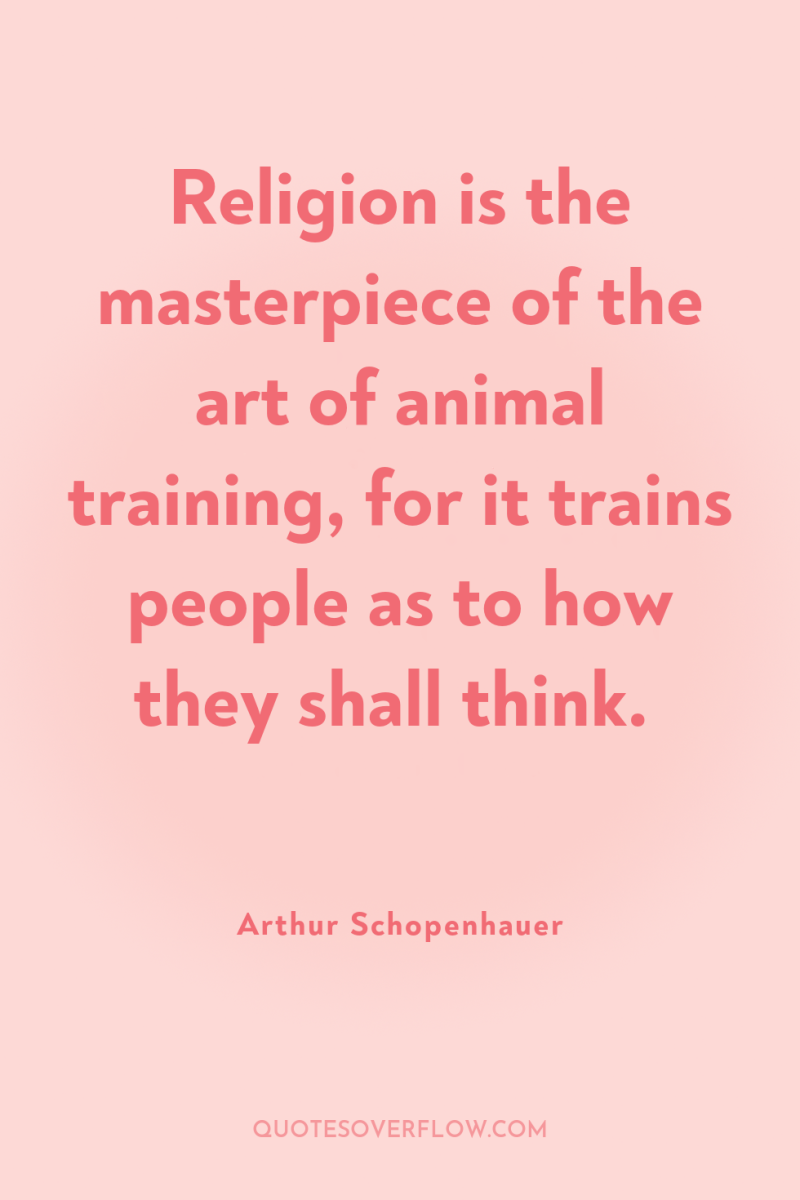
Religion is the masterpiece of the art of animal training, for it trains people as to how they shall think.Arthur Schopenhauer
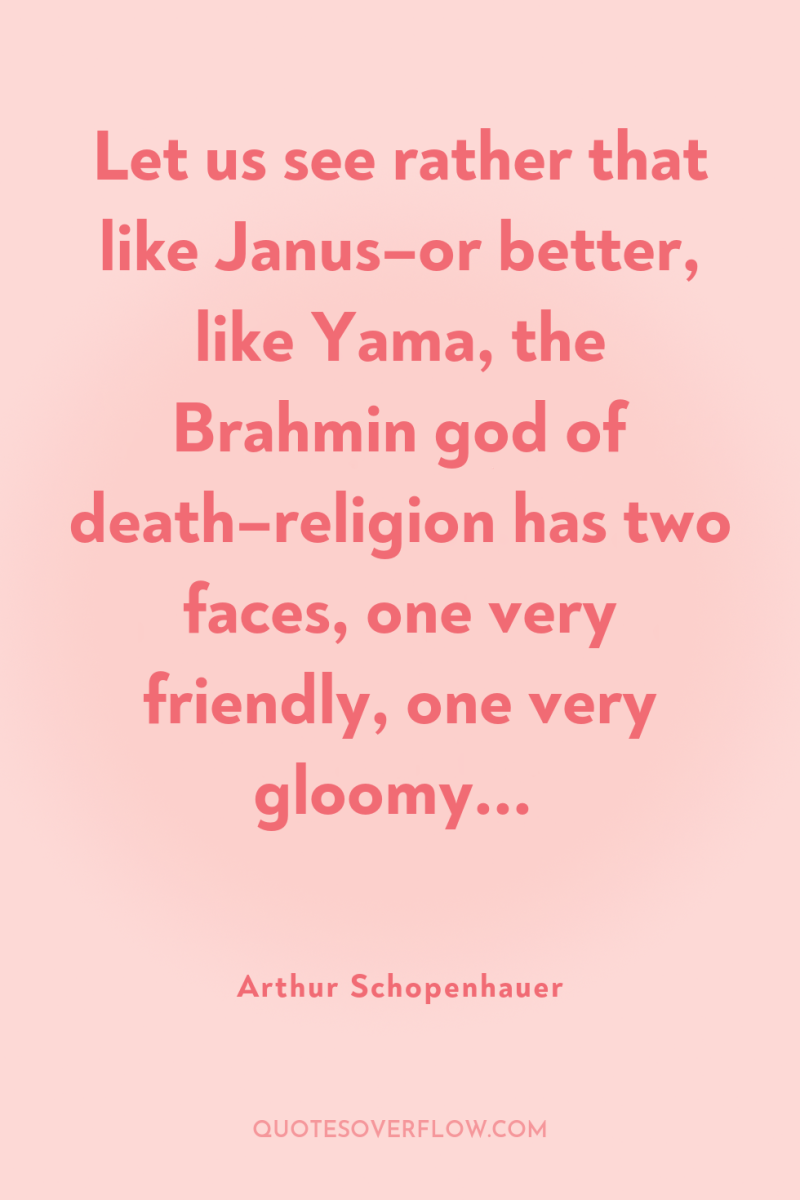
Let us see rather that like Janus–or better, like Yama, the Brahmin god of death–religion has two faces, one very friendly, one very gloomy...Arthur Schopenhauer
It is easy to understand that in the dreary middle ages the Aristotelian logic would be very acceptable to the controversial spirit of the schoolmen, which, in the absence of all real knowledge, spent its energy upon mere formulas and words, and that it would be eagerly adopted even in its mutilated Arabian form, and presently established as the centre of all knowledge.Arthur Schopenhauer
As the biggest library if it is in disorder is not as useful as a small but well-arranged one, so you may accumulate a vast amount of knowledge but it will be of far less value to you than a much smaller amount if you have not thought it over for yourself; because only through ordering what you know by comparing every truth with every other truth can you take complete possession of your knowledge and get it into your power.Arthur Schopenhauer

Buying books would be a good thing if one could also buy the time to read them in: but as a rule the purchase of books is mistaken for the appropriation of their contents.Arthur Schopenhauer
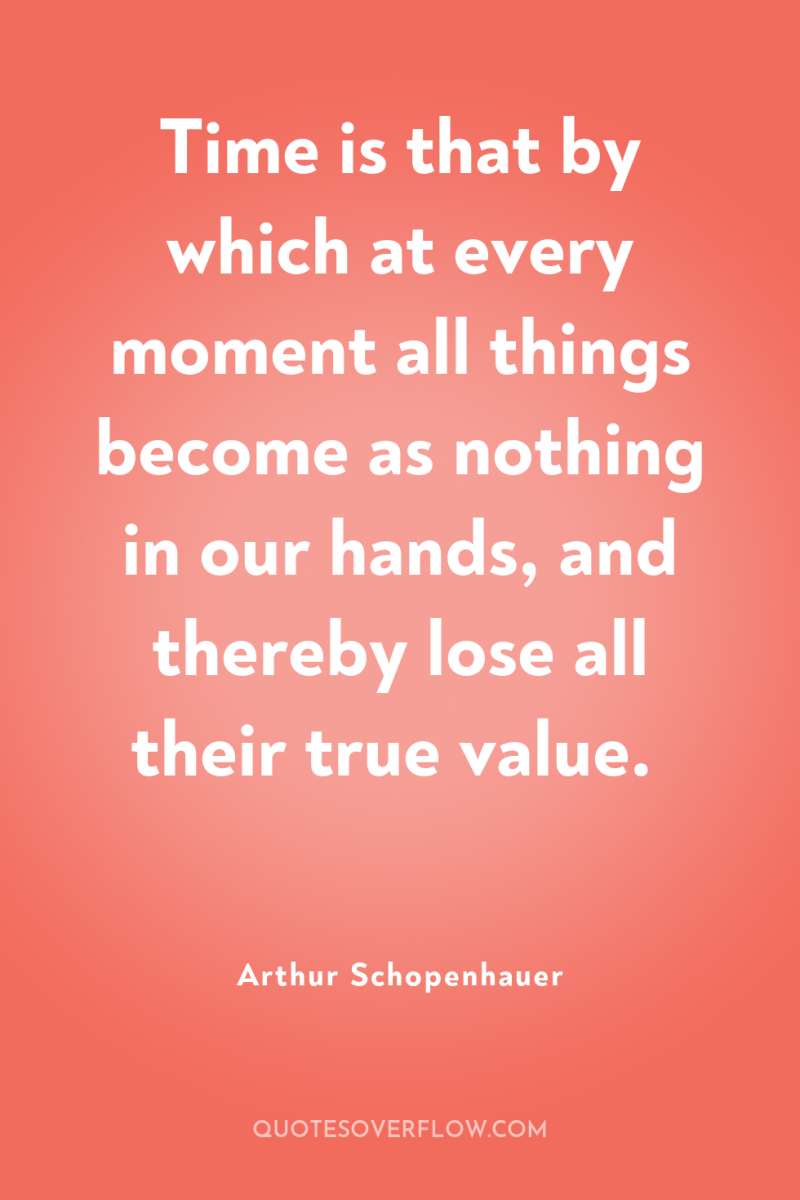
Time is that by which at every moment all things become as nothing in our hands, and thereby lose all their true value.Arthur Schopenhauer
When we read, another person thinks for us: we merely repeat his mental process. In learning to write, the pupil goes over with his pen what the teacher has outlined in pencil: so in reading; the greater part of the work of thought is already done for us. This is why it relieves us to take up a book after being occupied with our own thoughts. And in reading, the mind is, in fact, only the playground of another’s thoughts. So it comes about that if anyone spends almost the whole day in reading, and by way of relaxation devotes the intervals to some thoughtless pastime, he gradually loses the capacity for thinking; just as the man who always rides, at last forgets how to walk. This is the case with many learned persons: they have read themselves stupid.Arthur Schopenhauer
Reading is merely a surrogate for thinking for yourself; it means letting someone else direct your thoughts. Many books, moreover, serve merely to show how many ways there are of being wrong, and how far astray you yourself would go if you followed their guidance. You should read only when your own thoughts dry up, which will of course happen frequently enough even to the best heads; but to banish your own thoughts so as to take up a book is a sin against the holy ghost; it is like deserting untrammeled nature to look at a herbarium or engravings of landscapes.Arthur Schopenhauer

Buying books would be a good thing if one could also buy the time to read them but as a rule the purchase of books is mistaken for the appropriation of their contents.Arthur Schopenhauer
The art of not reading is a very important one. [.. .] [Y]ou should remember that he who writes for fools always find a large public. — A precondition for reading good books is not reading bad ones: For life is short.Arthur Schopenhauer
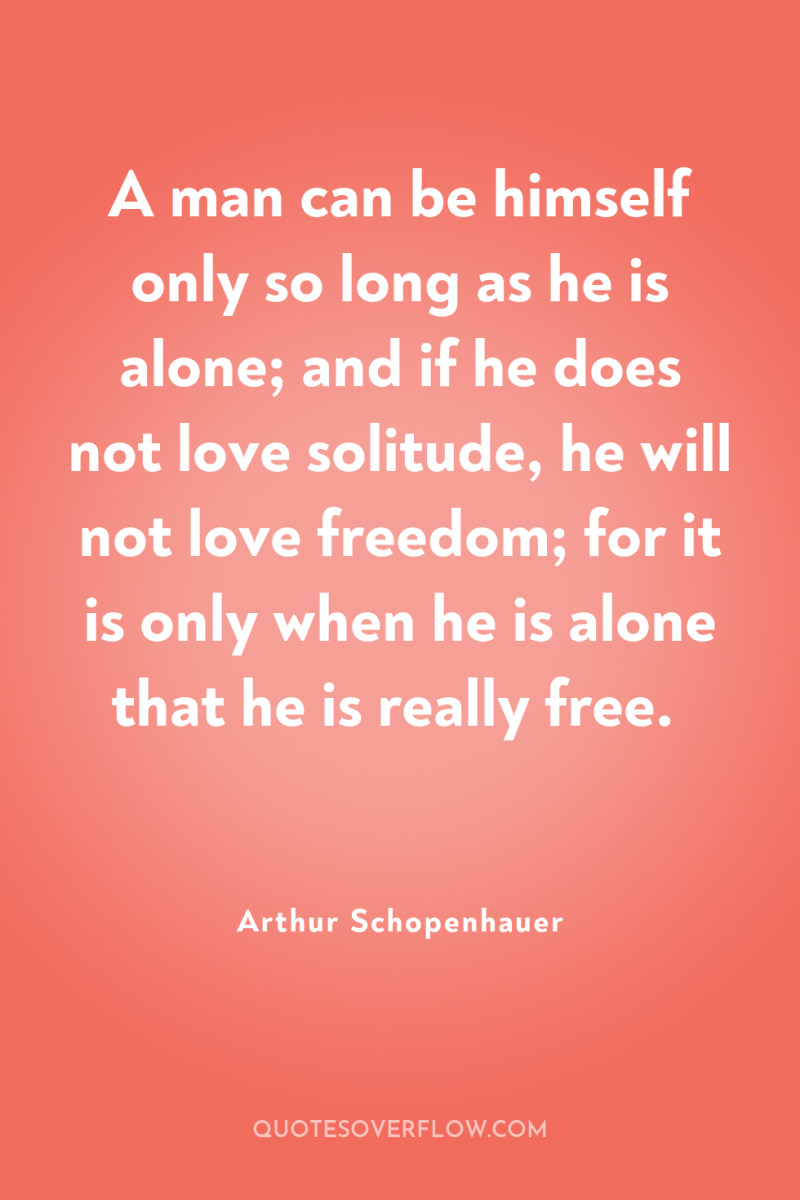
A man can be himself only so long as he is alone; and if he does not love solitude, he will not love freedom; for it is only when he is alone that he is really free.Arthur Schopenhauer
To free a man from error is not to deprive him of anything but to give him something: for the knowledge that a thing is false is a piece of truth. No error is harmless: sooner or later it will bring misfortune to him who harbours it. Therefore deceive no one, but rather confess ignorance of what you do not know, and leave each man to devise his own articles of faith for himself.Arthur Schopenhauer
I have not yet spoken my last word about women. I believe that if a woman succeeds in withdrawing from the mass, or rather raising herself from above the mass, she grows ceaselessly and more than a man.Arthur Schopenhauer
On hearing of the interesting events which have happened in the course of a man's experience, many people will wish that similar things had happened in their lives too, completely forgetting that they should be envious rather of the mental aptitude which lent those events the significance they possess when he describes them ; to a man of genius they were interesting adventures; but to the dull perceptions of an ordinary individual they would have been stale, everyday occurrences. This is, in the highest degree, the case with many of Goethe's and Byron's poems, which are obviously founded upon actual facts; where it is open to a foolish reader to envy the poet because so many delightful things happened to him, instead of envying that mighty power of fantasy which was capable of turning a fairly common experience into something so great and beautiful.Arthur Schopenhauer
Treat a work of art like a prince: let it speak to you first.Arthur Schopenhauer
... that when you're buying books, you're optimistically thinking you're buying the time to read them.( Paraphrase of Schopenhauer)Arthur Schopenhauer
One can never read too little of bad, or too much of good books: bad books are intellectual poison; they destroy the mind. In order to read what is good one must make it a condition never to read what is bad; for life is short, and both time and strength limited.Arthur Schopenhauer
Reading is thinking with someone else's head instead of ones own.Arthur Schopenhauer
This consists in not taking a book into one’s hand merely because it is interesting the great public at the time – such as political or religious pamphlets, novels, poetry, and the like, which make a noise and reach perhaps several editions in their first and last years of existence. Remember rather that the man who writes for fools always finds a large public: and only read for a limited and definite time exclusively the works of great minds, those who surpass other men of all times and countries, and whom the voice of fame points to as such. These alone really educate and instruct. One can never read too little of bad, or too much of good books: bad books are intellectual poison; they destroy the mind.Arthur Schopenhauer
[A]t bottom it is the same with traveling as with reading. How often do we complain that we cannot remember one thousandth part of what we read! In both cases, however, we may console ourselves with the reflection that the things we see and read make an impression on the mind before they are forgotten, and so contribute to its formation and nurture…Arthur Schopenhauer
There is an underlying unity in all thingsArthur Schopenhauer
I have long held the opinion that the amount of noise that anyone can bear undisturbed stands in inverse proportion to his mental capacity and therefore be regarded as a pretty fair measure of it.Arthur Schopenhauer
That the Negroes were enslaved more than other races, and on a large scale, is evidently a result of their being, in contrast to other races, inferior in intelligence - which, however, does not justify such slaveryArthur Schopenhauer
Clio, the muse of history, is as thoroughly infected with lies as a street whore with syphilis.Arthur Schopenhauer
Marrying means to halve one's rights and double one's dutiesArthur Schopenhauer
There is nothing to be got in the world anywhere; privation and pain pervade it, and boredom lies in wait at every corner for those who have escaped them. Moreover, wickedness usually reigns, and folly does all the talking. Fate is cruel, and human beings are pathetic.Arthur Schopenhauer
There are 80, 000 prostitutes in London alone and what are they, if not bloody sacrifices on the alter of monogamyArthur Schopenhauer
Every society requires mutual accommodation and mutually agreeable temper; hence the larger it is, the duller.Arthur Schopenhauer
Every man takes the limits of his own field of vision for the limits of the world.Arthur Schopenhauer
Any foolish boy can stamp on a beetle, but all the professors in the world cannot make a beetle.Arthur Schopenhauer
Truth that is naked is the most beautiful.Arthur Schopenhauer
I believe that when death closes our eyes we shall awaken to a light, of which our sunlight is but the shadow.Arthur Schopenhauer
Very often inertia, selfishness, and vanity play the greatest role in our trust in others; inertia when we prefer to trust somebody else, in order not to investigate, be vigilant, or act ourselves; selfishness when the desire to speak about our own affairs tempts us to confide in someone else; vanity when it concers something that we are proud of.Arthur Schopenhauer
It is for this reason that we find that co-existence, which could neither be intime alone, for time has no contiguity, nor in space alone, forspace has no before, after, or now,Arthur Schopenhauer
Compassion is the basis of morality.Arthur Schopenhauer
The assumption that animals are without rights and the illusion that our treatment of them has no moral significance is a positively outrageous example of Western crudity and barbarity. Universal compassion is the only guarantee of morality.Arthur Schopenhauer
Boundless compassion for all living beings is the surest and most certain guarantee of pure moral conduct, and needs no casuistry. Whoever is filled with it will assuredly injure no one, do harm to no one, encroach on no man's rights; he will rather have regard for every one, forgive every one, help every one as far as he can, and all his actions will bear the stamp of justice and loving-kindness.Arthur Schopenhauer
How is it possible that suffering that is neither my own nor of my concern should immediately affect me as though it were my own, and with such force that is moves me to action?Arthur Schopenhauer
Men are like children, in that, if you spoil them, they become naughty. Therefore it is well not to be too indulgent or charitable with anyone. You may take it as a general rule that you will not lose a friend by refusing him a loan, but that you are very likely to do so by granting it; and, for similar reasons, you will not readily alienate people by being somewhat proud and careless in your behavior; but if you are very kind and complaisant towards them, you will often make them arrogant and intolerable, and so a breach will ensue.Arthur Schopenhauer
There are tree main bulwarks of defence against new thoughts: to pay no heed, to give no credence, and finally to assert that it had already long existed.Arthur Schopenhauer
Wealth is like sea-water; the more we drink, the thirstier we become; and the same is true of fame.Arthur Schopenhauer
Spirit? Who is that fellow? And where do you know him from? Is he perhaps not merely an arbitrary and convenient hypostasis that you have not even defined, let alone deduced or proved? Do you think you have an audience of old women in front of you?Arthur Schopenhauer
If the immediate and direct purpose of our life is not suffering then our existence is the most ill-adapted to its purpose in the world.Arthur Schopenhauer
If you want a safe compass to guide you through life, and to banish all doubt as to the right way of looking at it, you cannot do better than accustom yourself to regard this world as a penitentiary.. - If you accustom yourself to this view of life you will regulate your expectations accordingly, and cease to look upon all its disagreeable incidents, great and small, its sufferings, its worries, its misery, as anything unusual or irregular; nay, you will find that everything is as it should be, in a world where each of us pays the penalty of existence in his own peculiar way.Arthur Schopenhauer
All striving comes from lack, from a dissatisfaction with one's condition, and is thus suffering as long as it is not satisfied; but no satisfaction is lasting; instead, it is only the beginning of a new striving. We see striving everywhere inhibited in many ways, struggling everywhere; and thus always suffering; there is no final goal of striving, and therefore no bounds or end to suffering.Arthur Schopenhauer
I cannot here withhold the statement that optimism, where it is not merely the thoughtless talk of those who harbor nothing but words under their shallow foreheads, seems to me to be not merely an absurd, but also a really wicked, way of thinking, a bitter mockery of the most unspeakable sufferings of mankind.Arthur Schopenhauer
One simple test of the claim that the pleasure in the world outweighs the pain…is to compare the feelings of an animal that is devouring another with those of the animal being devoured.Arthur Schopenhauer
It will generally be found that, as soon as the terrors of life reach the point at which they outweigh the terrors of death, a man will put an end to his life. But the terrors of death offer considerable resistance; they stand like a sentinel at the gate leading out of this world. Perhaps there is no man alive who would not have already put an end to his life, if this end had been of a purely negative character, a sudden stoppage of existence. There is something positive about it; it is the destruction of the body; and a man shrinks from that, because his body is the manifestation of the will to live. .Arthur Schopenhauer
It will generally be found that as soon the terrors of live reach the point where they outweigh the terrors of death, a man will put an end to his life.Arthur Schopenhauer
However, the struggle with that sentinel is, as a rule, not so hard as it may seem from a long way off, mainly in consequence of the antagonism between the ills of the body and the ills of the mind. If we are in great bodily pain, or the pain lasts a long time, we become indifferent to other troubles; all we think about is to get well. In the same way great mental suffering makes us insensible to bodily pain; we despise it; nay, if it should outweigh the other, it distracts our thoughts, and we welcome it as a pause in mental suffering. It is this feeling that makes suicide easy; for the bodily pain that accompanies it loses all significance in the eyes of one who is tortured by an excess of mental suffering. This is especially evident in the case of those who are driven to suicide by some purely morbid and exaggerated ill-humor. No special effort to overcome their feelings is necessary, nor do such people require to be worked up in order to take the step; but as soon as the keeper into whose charge they are given leaves them for a couple of minutes, they quickly bring their life to an end. When, in some dreadful and ghastly dream, we reach the moment of greatest horror, it awakes us; thereby banishing all the hideous shapes that were born of the night. And life is a dream: when the moment of greatest horror compels us to break it off, the same thing happens.Arthur Schopenhauer
The origin of wickedness is the cliff upon which theism, just as much as pantheism, is wrecked; for both imply optimism. However, evil and sin, both in their terrible magnitude, cannot be disavowed; indeed, because of the promised punishments for the latter, the former is only further increased. Whence all this, in a world that is either itself a God or the well-intentioned work of a God?Arthur Schopenhauer
God, who in the beginning was the creator, appears in the end as revenger and rewarder. Deference to such a God admittedly can produce virtuous actions; however, because fear of punishment or hope for reward are their motive, these actions will not be purely moral; on the contrary, the inner essence of such virtue will amount to prudent and carefully calculating egoism.Arthur Schopenhauer
The Jews are the scum of the earth, but they are also great masters in lying.Arthur Schopenhauer
Rascals are always sociable, and the chief sign that a man has any nobility in his character is the little pleasure he takes in others company.Arthur Schopenhauer
When we see that almost everything men devote their lives to attain, sparing no effort and encountering a thousand toils and dangers in the process, has, in the end, no further object than to raise themselves in the estimation of others; when we see that not only offices, titles, decorations, but also wealth, nay, even knowledge[1] and art, are striven for only to obtain, as the ultimate goal of all effort, greater respect from one's fellowmen, –is not this a lamentable proof of the extent to which human folly can go? .Arthur Schopenhauer
If life – the craving for which is the very essence of our being – were possessed of any positive intrinsic value, there would be no such thing as boredom at all: mere existence would satisfy us in itself, and we should want for nothing.Arthur Schopenhauer
Health so far outweighs all external goods that a healthy beggars is truly more fortunate than a king in poor health.Arthur Schopenhauer
In general, nine-tenths of our happiness depends on our health alone.Arthur Schopenhauer
Unless suffering is the direct and immediate object of life, our existence must entirely fail of its aim. It is absurd to look upon the enormous amount of pain that abounds everywhere in the world, and originates in needs and necessities inseparable from life itself, as serving no purpose at all and the result of mere chance. Each separate misfortune, as it comes, seems, no doubt, to be something exceptional; but misfortune in general is the rule. I know of no greater absurdity than that propounded by most systems of philosophy in declaring evil to be negative in its character. Evil is just what is positive; it makes its own existence felt.Arthur Schopenhauer
Optimism, where it is not just the thoughtless talk of someone with only words in his flat head, strikes me as not only absurd, but even a truly wicked way of thinking, a bitter mockery of the unspeakable sufferings of humanity.Arthur Schopenhauer
Life is a constant process of dying.Arthur Schopenhauer